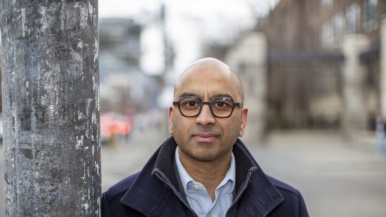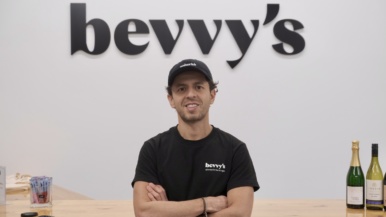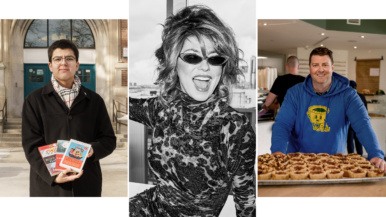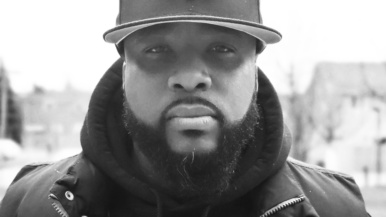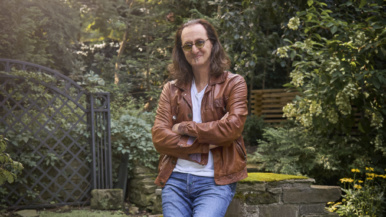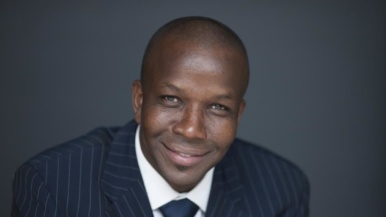Q&A: Kellie Leitch, the potential future prime minister who wants to bring President-elect Trump’s message to Canada
In the wake of the Donald’s stunning win, Leitch doubled down on her pledge to screen for anti-Canadian values at the border. A conversation with the Conservative leadership contender about her upbringing, her risky political strategy and what happens next

Kellie with an “ie.” What is this sorcery?
My first name is actually Khristinn—it’s Icelandic—and my middle name is Kellie. I’m named after my grandfathers, Christinn Gunnar Johnston and Peter Kelburne Leitch, whose nickname was Kelly with a y, so I was Kellie II for most of my life
Do you ever go by Khristinn now?
I have attempted many times, but everyone mispronounces it. It’s said just normally—“Kristen.” Kellie’s easier.
Unlike some of the other leadership contenders, you can claim longtime Conservative Party affiliation. What drew you to the party at age 14?
My dad, who was a riding president in Fort McMurray. In 1979, one of his close friends decided to run, and my dad encouraged our family to get involved. When I was eligible to join the party, at 14, I did, and I’ve stayed involved ever since.
If you had come home with a Tommy Douglas tattoo, your dad wouldn’t have freaked out?
Oh no, not at all. My father is an approachable, well-educated guy. I grew up around a dinner table where we learned what it means to be conservative, and my value structure matched that value structure. My mom had a high school education but was very engaged in our community. Our parents wanted us to do public service, whether that was the YMCA or our school activities or with the party.
You skipped sixth grade, graduated high school at 16 and started University at 17.
Yep.
Genius or impatient?
Hardworking. My mom passed away from breast cancer when I was young, and I think when you lose a parent, you realize that life is precious and if you want to get things done, you should get to it.
As a kid, did you then develop a checklist of things to achieve?
No. In fact, I took arts in undergrad, because I wasn’t sure what I wanted to do. I ended up applying to sciences, which was more my thing, did medical school and an MBA.
What about medicine interested you?
I wasn’t cut out for law or a master’s of science. I was interested in a business degree but you had to have two or three years of working experience, which I didn’t have because I’d finished undergrad at 19. So I applied to medical school because it was the lesser of all the evils. In third year, I was assigned to the pediatric orthopedics at SickKids in Toronto with Dr. Robert Salter, who is a global icon in the field. I fell in love with it. I realized that I really enjoyed being able to treat kids who couldn’t play on the playground and get them back out to play.
You did your surgical residency at U of T. What did you make of the city at the time?
I loved Toronto. Toronto is one of the best places in the world, if not the best, to live. I’ve travelled a lot and this is an amazing city. It’s diverse. Good grief—I grew up in Fort McMurray, Alberta. My parents moved there in 1974 and we lived in a trailer for a year and had a regular modest home. All of a sudden I’m living in downtown Toronto among skyscrapers and going to an enormous university that has the same population as my hometown.
Right. After leaving, you told your dad Toronto had “no sense of community,” that it wasn’t a place where you could go next door for a cup of sugar.
That’s true.
Care to make amends here and now?
I don’t know if I’d make amends, but it was different, right? I had grown up in a place where if I was coming home from school and my mom wasn’t home, I just walked down a door or two and I had a place where I could go inside and watch TV and play with my friends until my mom got home. In Toronto, I had a great sense of community at the hospital, but I was living in a condo where my neighbours were often not home. And where I live now, it’s much more like home.
Which is Creemore, correct?
Yeah. I live on 50 acres that used to be an apple orchard. I can drive into town and people are home. And you can ask for your cup of sugar if you need it.
You talk a lot about kids on the campaign trail. Do you have any of your own?
I don’t have kids, I’m not married and I haven’t been married. I would love to have children but with the roles that I’ve had, and I guess just circumstances… I’ve had a number of boyfriends but it just hasn’t stuck. Hopefully in the future that will happen, and I’ll be blessed with a family, too.
Do you have a partner?
I’m seeing a fellow right now, and it’s very new.
What can you tell us about him?
He’s from my riding.
Moving on! You are highly disciplined and on-message in the public eye. What does Dr. Kellie Leitch look like with her hair down, so to speak?
Very similar. I am quite disciplined when it comes to messaging in this new role, as I was in my previous role in cabinet. And as a surgeon, I don’t have the luxury of making a mistake. When you’re disciplined, there are fewer complications. Basically, you get what you see. I’m pretty straightforward. Sometimes people think I’m a little too straightforward, but I’d rather people know who I am than have to be guessing.
I understand you organized a girls’ trip to Las Vegas recently.
Oh gosh. This is becoming infamous now.
And to see Britney Spears, no less. The floor is yours.
Haha. It was March or April of this year. On the trip was an academic who runs a health innovation centre, a woman who was the general manager of Mary Kay Canada, and a woman who worked for one of the largest IT firms in Canada. It was a wide range. We saw Britney, Cirque Du Soleil, and my girlfriends obviously like to shop…I’m not such a keen shopper, although now I find myself letting them dress me.
Are you a gambler?
Not at all. I went and watched other people.
What’s your game?
Blackjack. I shouldn’t say that. Maybe I did play. I mean, I play but not very much. But yes, my game is blackjack.
How would your friends and family describe you?
Hardworking. I hope they’d say smart. Intense. I hope somebody would say I’m fun and spontaneous, too. But they’d probably go through the other adjectives first.
I’d say those are things we know about you. What’s one thing we don’t?
I’m a very compassionate and sensitive person. And I love kids. [tears up]
I notice you often tear up when talking about kids. Here is some Kleenex.
No, no. It’s fine. It’s true. It’s funny, for someone who doesn’t have kids, what’s the best way of putting it? I care about them deeply, no matter who they come from. And I think that that makes me a better physician.
When Jim Flaherty approached you in 2010 to run for office, you resisted. Why?
Because I love my work. I struggled deciding whether or not I would run. And I do miss it.
Do you still work?
Yes, I volunteer at the ER.
How would you characterize your conservatism? Social? Fiscal? Both?
Fiscal.
Are you ready for a social-conservatism lightning round?
I’m ready.
Abortion.
Pro-life.
Recreational marijuana.
No.
Right to die.
I voted against it.
Same-sex marriage.
I am for it.
Gender parity in the cabinet.
If it’s merit-based, which I believe it could be.
A bit of a mixed bag, Dr. Leitch.
Well, yes, I am pro-life. But remember, I take care of injured and disabled children, right?
And you grew up Catholic.
And I grew up Catholic. But I also have said that I have no intention of bringing the abortion issue back to the House of Commons.
Who was our greatest Prime Minister?
Sir John A. MacDonald. He built the country.
Despite your sparkling resumé, most Canadians know you as the person behind the proposal to screen newcomers for “anti-Canadian values.” No matter how you spin it, that sounds pretty gross. Do you regret going down that road?
No. I believe in a unified Canadian identity: equality of opportunity, hard work, generosity, freedom and tolerance. And that value set is what built our country. I will absolutely protect our Canadian identity because I think we have one that we have to protect. And I think Canadians agree with me.
Aren’t tolerance and screening for anti-Canadian values antithetical concepts?
Not at all. My team sent out an email survey and asked a single question: Should Canada be screening for anti-Canadian values. Seventy per cent of Canadians said yes. And then a whole bunch of people jumped to conclusions.
Who exactly is threatening those values?
I’m not saying someone’s threatening them. That’s what the media is saying. What I’m saying is we need to protect what we have.
The notion of protection presupposes a threat.
I don’t think it’s a question of threatening; I think it’s a question of protecting. I don’t think that violence, for example, misogyny, I don’t think that those are Canadian values.
But, respectfully, no one does.
I completely agree with you! Exactly.
So why the alarm?
Because as I say, Canadians are concerned about this. The concern of the majority of Canadians is from people who are immigrating into the country. Hence the suggestion of screening.
So newcomers to the country are threatening the values that we hold dear.
That’s what the majority of Canadians are talking about. Right now we screen for security reasons. We ask people questions about their salary at their border, economic questions, their skillset. Is it really all that hard to ask them if they believe in the equality of women?
We already screen for “hard work” by making sure that a potential newcomer is going to be a positive contributor to the economy. We already screen for criminal backgrounds. We already screen for health concerns. That’s not enough?
Why would we not safeguard freedom? And safeguard against intolerance? That’s what we hold dear. That if you have a different sexual orientation than myself, that’s totally okay. You can love whoever you want.
We have the Charter.
Exactly. And we have that for Canadian citizens. We live under certain laws here. We’re talking about the new individuals coming into the country.
Immigrants have to abide by our laws, too.
I agree. But why wouldn’t we ask them at the border if they agree with these things? That’s what I’m saying.
I imagine it would go something like this: “Do you believe women are property?” “Nope!” Boom, system defeated.
Well, in the past, we used to do a lot of face-to-face, one-on-one interviews. Our immigration officers did a good job of that. And we don’t do that as much now.
The subtext here is xenophobia, and specifically anti-Muslim xenophobia. If you’re horrified by that insinuation, why don’t you dispel the notion?
But why is it just about Islam? This isn’t anti-Muslim. This isn’t anti-anyone.
The examples that you’ve given are about stoning gay people, which—
And I’ve also been asked by the media about if I would deny entry to a Roman Catholic who opposes gay marriage.
So what’s the answer?
So let’s be very clear here, right?
That’s my goal.
Well, I am trying to be very clear. Maybe defining Canadian identity isn’t important to you. It’s not important to our Prime Minister. If we have a core identity as a country, we have a shared set of values, we protect those, we have new immigrants coming into the country, we can integrate them into that shared value set, and we become an even stronger country together in the future.
When people allege that what you’re saying is code for no Muslims, how do you answer?
It isn’t anti-Muslim. It’s pro-Canadian.
If you’re not alleging Muslims are a threat, then who is?
So you’re trying to insinuate by asking the question, that I’m trying to “protect” us from someone.
Because you said that.
No.
Respectfully, you said you wanted to protect…
Our Canadian values.
From immigrants. And I’m asking you for specifics.
And I’m saying, that immigrant could be a white guy like you coming from Australia. It could be anyone. I just think we should be asking the question.
You’ve been down this road before. How annoyed were you that Harper forced you and Chris Alexander to be the face of the Barbaric Cultural Practices tip line?
Politics is a team sport. Chris is my friend and I’m part of a team. It’s not for me to say I like or dislike something. I’m a team player.
But it wasn’t your initiative. You didn’t come up with the idea.
No, but the intention was the right one. It was to protect women and girls. It was an atrocious announcement and we had terrible communications on it. But that was the intent.
You said you regretted your involvement in that announcement.
I did. Because we failed to communicate clearly. We failed to provide for those young women and girls what would’ve been constructive and helpful to them.
Do you fear that the same kind of error of communication might take place with this latest gambit?
No. The reason people come to this country is because we have freedom—about where and how to worship. And that’s the same for an individual who’s Muslim. In this country they get to choose.
But our laws wouldn’t change because some yahoo makes it through the border.
The laws aren’t going to change, but I don’t want an individual who has a child and says to his daughter, “You’re only going to a segregated mosque.” Or if you have a father who thinks his daughter is a piece of property.
But if we turn that father and daughter away at the border, and they go back to wherever they came from, isn’t that a worse fate for that kid? I would rather have them here, where our laws and values give that daughter a better chance.
I’d rather have them all here.
Huh? So why all this talk of anti-Canadian values?
Because as I say, Canadians are asking that this be done. Seventy per cent of Canadians are asking that this be done.
But you’re the one running for the leadership.
I care what 70 per cent of Canadians think. Because as leader of this country, you have a responsibility to listen to them, go out and help make sure this country has a shared vision.
Did you just contradict yourself?
I would say that I shouldn’t be so verbose. Obviously we can’t have a hundred million people come to Canada.
Fair enough. You’re no fan of Trudeau, is there anything he’s doing right, in your view?
He and his team are masterful at social media, and he is viewed as extremely approachable, which is endearing for folks.
How do you think he has fared so far?
He’s following down the same path as his father. There are a lot of people in Alberta but also in the Prairies that are really struggling. And I don’t think the government of Canada or the Prime Minister have any clue what that means.
In what regard?
He’s failing to address the job loss crisis in the Prairies, where tens of thousands of people are out of work. Many of those people their severance is about to run out if it hasn’t already. They’re desperate. They can’t feed their kids. They can’t afford their mortgage. And we have a government in Ottawa that doesn’t seem to understand that whether it’s building a pipeline or not having a carbon tax, there might be some hope for those people.
The Conservative convention is in May. If you win, the next step is the general election. What would be the first thing you’d do as Prime Minister?
I think that young Canadians deserve to reap the rewards of Canada’s equality of opportunity. I’d focus on making sure that every young Canadian has a job.
How would you do that?
If I try to speculate four years from now on the state of the economy, I think that’s a little bit of a stretch to be honest with you.
Have you spoken to Mr. Harper since he left office?
Just once.
Phone or in person?
In person. I just went to tell him that I was running for the leadership.
And what did he say?
He encouraged me to do so, and said that it’s going to be a long race and to pace myself.
And how are you holding up so far?
I think I’m doing okay. It is a long walk.
